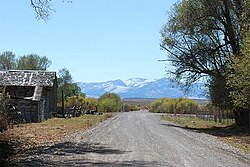Ibapah (/ˈaɪbəpɑː/ EYE-bə-pah) is a small unincorporated community in far western Tooele County, Utah, United States, near the Nevada state line.
Ibapah | |
|---|---|
 The roadway through Ibapah, September 2007 | |
| Coordinates: 40°02′12″N 113°59′07″W / 40.03667°N 113.98528°W | |
| Country | United States |
| State | Utah |
| County | Tooele |
| Settled | 1859 |
| Named for | Goshute Ai-bim-pa "White Clay Water" |
| Elevation | 5,282 ft (1,610 m) |
| Time zone | UTC-7 (Mountain (MST)) |
| • Summer (DST) | UTC-6 (MDT) |
| ZIP code | 84034 |
| Area code | 435 |
| GNIS feature ID | 1437592[1] |
Description
edit| Census | Pop. | Note | %± |
|---|---|---|---|
| 1860 | 6 | — | |
| 1880 | 174 | — | |
| 1890 | 117 | −32.8% | |
| 1900 | 353 | 201.7% | |
| 1910 | 256 | −27.5% | |
| 1920 | 120 | −53.1% | |
| 1930 | 152 | 26.7% | |
| 1940 | 133 | −12.5% | |
| 1950 | 70 | −47.4% | |
| Source: U.S. Census Bureau[2] | |||
The settlement is located near the Deep Creek Mountains. The site was originally established in 1859 by Mormon missionaries sent to teach the local Native Americans farming methods. A Pony Express station operated here in 1860 and 1861, and the town was on an early alignment of the Lincoln Highway. A post office operated here from 1883 to 1980. Ibapah is currently inhabited mostly by Goshute people, with scattered farmlands and a trading post belonging to more recent settlers. The community is the headquarters of the Confederated Tribes of the Goshute Reservation, a federally recognized tribe.
Originally named Deep Creek for a creek of the same name in the area, the name was later changed to Ibapah, an anglicized form of the Goshute word Ai-bim-pa or Ai'bĭm-pa which means "White Clay Water".[3][4]
The town is isolated and is usually reached by going out of Utah into Nevada and back into Utah.
Climate
editThe climate is typical of that of a high elevation Great Basin location, being semi-arid and featuring, in consequence, large differences in temperature between day and night.
| Climate data for Ibapah, Utah, 1991–2020 normals, 1903–2020 extremes: 5279ft (1609m) | |||||||||||||
|---|---|---|---|---|---|---|---|---|---|---|---|---|---|
| Month | Jan | Feb | Mar | Apr | May | Jun | Jul | Aug | Sep | Oct | Nov | Dec | Year |
| Record high °F (°C) | 68 (20) |
75 (24) |
82 (28) |
89 (32) |
98 (37) |
105 (41) |
111 (44) |
108 (42) |
102 (39) |
94 (34) |
80 (27) |
73 (23) |
111 (44) |
| Mean maximum °F (°C) | 58.6 (14.8) |
63.6 (17.6) |
74.6 (23.7) |
80.8 (27.1) |
88.9 (31.6) |
96.5 (35.8) |
102.2 (39.0) |
100.4 (38.0) |
94.5 (34.7) |
84.5 (29.2) |
71.3 (21.8) |
60.4 (15.8) |
103.0 (39.4) |
| Mean daily maximum °F (°C) | 45.0 (7.2) |
49.1 (9.5) |
58.3 (14.6) |
64.1 (17.8) |
73.2 (22.9) |
84.9 (29.4) |
94.2 (34.6) |
92.8 (33.8) |
82.9 (28.3) |
69.0 (20.6) |
54.7 (12.6) |
44.7 (7.1) |
67.7 (19.9) |
| Daily mean °F (°C) | 28.7 (−1.8) |
32.9 (0.5) |
40.8 (4.9) |
46.2 (7.9) |
54.1 (12.3) |
63.0 (17.2) |
71.0 (21.7) |
69.2 (20.7) |
60.0 (15.6) |
48.2 (9.0) |
36.7 (2.6) |
28.4 (−2.0) |
48.3 (9.0) |
| Mean daily minimum °F (°C) | 12.4 (−10.9) |
16.8 (−8.4) |
23.3 (−4.8) |
28.3 (−2.1) |
35.0 (1.7) |
41.2 (5.1) |
47.9 (8.8) |
45.5 (7.5) |
37.1 (2.8) |
27.4 (−2.6) |
18.8 (−7.3) |
12.0 (−11.1) |
28.8 (−1.8) |
| Mean minimum °F (°C) | −8.8 (−22.7) |
−3.6 (−19.8) |
9.5 (−12.5) |
16.7 (−8.5) |
21.5 (−5.8) |
29.6 (−1.3) |
37.0 (2.8) |
34.3 (1.3) |
22.8 (−5.1) |
12.2 (−11.0) |
1.5 (−16.9) |
−7.5 (−21.9) |
−13.9 (−25.5) |
| Record low °F (°C) | −39 (−39) |
−32 (−36) |
−17 (−27) |
2 (−17) |
8 (−13) |
20 (−7) |
23 (−5) |
21 (−6) |
10 (−12) |
−5 (−21) |
−18 (−28) |
−38 (−39) |
−39 (−39) |
| Average precipitation inches (mm) | 0.79 (20) |
0.87 (22) |
1.09 (28) |
1.44 (37) |
1.41 (36) |
0.90 (23) |
0.71 (18) |
0.77 (20) |
0.68 (17) |
0.69 (18) |
0.54 (14) |
0.63 (16) |
10.52 (269) |
| Average snowfall inches (cm) | 6.10 (15.5) |
6.70 (17.0) |
4.20 (10.7) |
1.80 (4.6) |
0.00 (0.00) |
0.00 (0.00) |
0.00 (0.00) |
0.00 (0.00) |
0.00 (0.00) |
0.60 (1.5) |
3.80 (9.7) |
6.70 (17.0) |
29.9 (76) |
| Source 1: NOAA[5] | |||||||||||||
| Source 2: XMACIS2 (records & 1991-2020 monthly max/mins)[6] | |||||||||||||
See also
editReferences
edit- ^ a b U.S. Geological Survey Geographic Names Information System: Ibapah
- ^ "Census of Population and Housing". U.S. Census Bureau. Archived from the original on February 8, 2006. Retrieved October 20, 2011.
- ^ Van Cott, John W. (1990). Utah Place Names. Salt Lake City, Utah: University of Utah Press. p. 197. ISBN 0-87480-345-4.
- ^ The University of Utah - Shoshoni Dictionary
- ^ "Ibapah, Utah 1991-2020 Monthly Normals". Retrieved March 13, 2024.
- ^ "xmACIS". National Oceanic and Atmospheric Administration. Retrieved March 13, 2024.
External links
editMedia related to Ibapah, Utah at Wikimedia Commons
